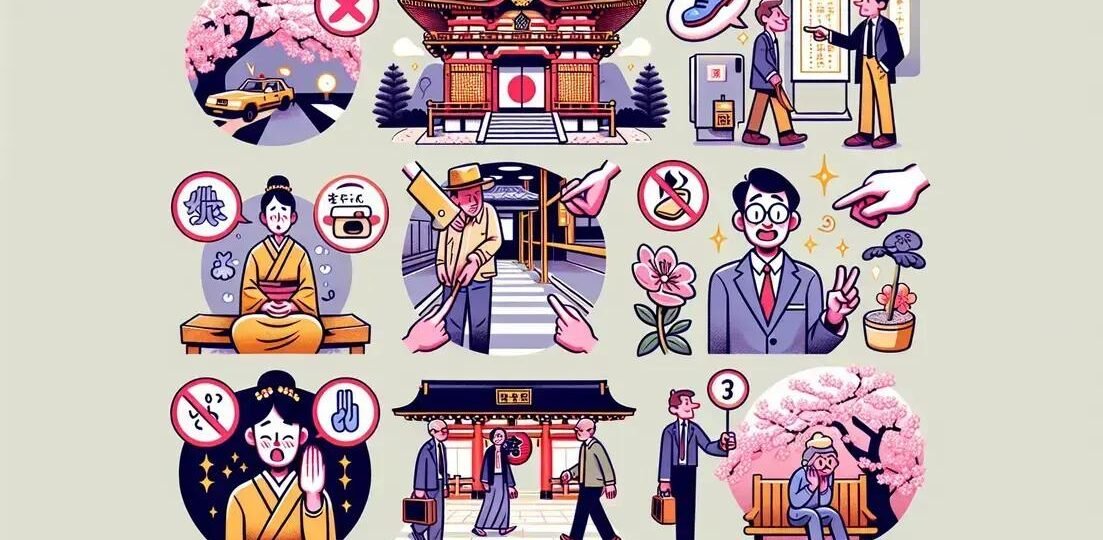What not to do in Japan – tourist mistakes to avoid in Japan
November 9, 2024 | by Andrew Keys

When visiting Japan, understanding and respecting local customs can greatly enhance your experience.
There are several common tourist mistakes to avoid, ensuring you don’t inadvertently offend anyone.
By being aware of cultural norms and what not to do in Japan, you’ll have a more enjoyable and memorable trip.
This guide walks you through key etiquette points and common pitfalls tourists often face, helping you navigate Japan like a local.
From understanding dining etiquette to knowing how to behave on public transport, you’ll find essential tips to enrich your travel experience.
Respecting Cultural Norms
When visiting Japan, it’s crucial to adhere to cultural norms as a sign of respect. Japanese society values harmony and is deeply rooted in traditions that govern behavior. For tourists, understanding these conventions will not only enhance their experience but also prevent unintentional offense.
One key aspect is bowing when greeting others, which demonstrates humility and respect. While a simple nod might be sufficient for tourists, witnessing and imitating the correct form can enrich interactions.
Likewise, silence is often golden. Observing the unwritten rule of speaking quietly in public places, like trains and restaurants, is crucial. This respect for personal space and tranquility showcases an understanding of the local culture.
Another important aspect is using both hands when giving or receiving items such as money or a business card. This practice reflects attention to detail and respect for the transaction.
By being mindful of these social etiquettes, visitors contribute to their positive travel experiences while appreciating Japan’s unique cultural tapestry.
Quietness in Public Spaces

In Japan, public spaces are known for their tranquility. Visitors should be mindful of keeping noise levels down, especially in places like trains, buses, and temples. Speaking softly and avoiding loud conversations or phone calls is important to show respect to others around you.
While on public transport, it’s common practice for locals to wear headphones and minimize disturbances. Observing this etiquette not only helps maintain peace but also aligns with the societal emphasis on harmony. Many Japanese individuals use this travel time for rest or quiet reflection, so it’s crucial for tourists to adapt to this silent environment.
It’s equally important to note that while this might feel unusual to visitors from more boisterous cultures, the quietness is deeply embedded into Japanese culture. Embrace the calm and enjoy the opportunity for self-contemplation or simply to enjoy the journey with minimal disruptions.
Understanding these cultural nuances enriches the travel experience. By contributing to this cherished part of Japanese life, tourists display thoughtful appreciation of cultural diversity.
Proper Dining Etiquette
Understanding proper dining etiquette is crucial when visiting Japan. One should never stick chopsticks upright in a bowl of rice as it resembles a funeral practice and is considered bad luck. Instead, lay them gently on the side of the dish or use the chopstick holder.
When eating sushi, you can use your hands or chopsticks, but remember not to rub disposable chopsticks together; it implies they are cheap and of poor quality, which can be offensive to the restaurant. It’s important to place chopsticks parallel to yourself with the tips to the left when finished.
If you are presented with soup, it’s perfectly fine and even expected to slurp your noodles. This is seen as a compliment to the chef and indicates that you’re enjoying the meal. Avoid pouring soy sauce over white rice as it is seen as disrespectful to rice, which is a staple and revered dish in Japanese cuisine.
When sharing dishes, you should never pass food from chopstick to chopstick since this mimics a funeral rite. Instead, use the opposite end of your chopsticks or serving utensils provided. It’s polite to say ‘Itadakimasu’ before starting your meal, a phrase expressing gratitude, and ‘Gochisousama’ after finishing your meal as a way to thank for the food.
Understanding these simple yet vital dining etiquettes can greatly enhance your dining experience in Japan.
Shoes Off Indoors

In Japan, removing your shoes when entering someone’s home is a common practice and it’s deeply rooted in the culture. When visiting someone’s residence, remember to take off your shoes at the entryway, known as the genkan, and place them neatly, pointing toward the door. You will often find slippers provided for indoor use. This custom helps keep the living space clean, as outdoor shoes are considered dirty.
It’s not only homes that observe this tradition; certain restaurants, traditional accommodations like ryokans, and even some temples require visitors to remove their shoes. Be sure to notice signs or cues at the entrance and follow suit.
In schools, students wear indoor shoes which prevent outdoor dirt from entering learning spaces. If visiting such environments, you may be asked to wear slippers or special coverings over your shoes.
When unsure, look to others or ask politely if shoes should be removed. It’s always better to ask than to accidentally disrespect cultural norms. Japanese interiors often feature tatami mats, which can be damaged by shoes, making this practice not just cultural but practical.
Understanding Cultural Sensitivity
Respect for such customs showcases your awareness of cultural differences and a willingness to adapt, leading to a better travel experience. When planning your visit, consider packing socks or stockings since you will often be in situations requiring shoe removal.
No Tipping Culture
In Japan, tipping is not a common practice, and it can even be seen as rude or insulting. Avoid tipping in restaurants, hotels, or taxis. Instead, appreciate the high-quality service offered, as it’s a part of the job and not an extra favor that requires compensation.
In many Western countries, tipping is customary and expected for certain services but not in Japan. Japanese service providers take pride in their work and providing excellent service is a reflection of their professionalism. Adding a tip can suggest an implication that they need to improve, which is far from your intention as a polite visitor.
To express gratitude, learn simple phrases like “arigatou gozaimasu” (thank you very much). This is well-received and appreciated far more than tipping. If you do feel the need to reward someone for exceptional service, consider handing them a small gift instead of money. However, even gifts should be given with care, as there are cultural specifics to be mindful of, such as how they’re wrapped and presented.
Having a strong understanding of Japan’s no tipping culture will enrich your travel experience and ensure you respect one of the many fascinating cultural norms that make Japan unique.
Be Punctual

In Japan, time is seen as a valuable commodity, and being on time is a reflection of respect and reliability. When meeting someone or attending an event, strive to arrive at least five minutes early. This punctuality ensures you honor the commitments made to hosts, guides, or even casual meet-ups.
Public transportation in Japan is renowned for its efficiency and timing. Whether you’re catching a train, bus, or flight, note the exact departure times and plan to be at the stop or terminal in advance. Delays are uncommon, and missing your scheduled transport might lead to unnecessary stress and complications.
In business settings, punctuality is even more crucial. Being late to a business meeting can be taken as a sign of disrespect or lack of interest. Instead, be ready ahead of time, allowing for any unexpected delays in travel.
Understanding the local appreciation for time helps blend in more comfortably with the Japanese lifestyle and shows that you respect their efficient way of life. So, synchronize your watches and make the habit of punctuality part of your travel routine in Japan.
Handling Trash Properly
In Japan, trash disposal might initially seem complex due to the strict waste separation policies, but understanding and adhering to them is crucial. Many public spaces lack trash cans, which encourages carrying your waste with you until you find the proper disposal point. It’s common to separate combustible, non-combustible, and recyclable waste, such as plastics, glass, and paper. This not only helps with efficient waste management but also supports environmental sustainability.
When dealing with garbage, avoid leaving it in places not designated for litter disposal, as this is considered highly disrespectful. In convenience stores and train stations, you might find waste bins, but ensure you use the correct one, as there are often specific bins for different types of waste. At home or in accommodations, follow the local guidelines posted, usually found on signs indicating what waste goes out on which days.
Incorrect handling of trash not only disrupts this well-organized system but can also lead to fines or negative interactions with local residents who take proper waste disposal seriously. Simply put, embracing Japan’s disposal practices contributes to the overall cleanliness and orderliness the country is known for, allowing you to respect the cultural emphasis on cleanliness and careful environmental stewardship.
Queuing Up Politely

While waiting in lines might seem straightforward, understanding queuing etiquette in Japan is crucial for tourists. Japanese people value orderly behavior and respect for rules in public spaces. When queuing up, it’s important to stand in an orderly line and avoid cutting in front of others, which can be seen as rude and inconsiderate.
Forming lines is not restricted to just purchasing tickets; you’ll encounter lines when waiting for trains and buses as well. Be sure to follow the floor markings which often guide where to queue. In crowded areas, it’s common to see lines for escalators and elevators too. Japanese people are used to queuing patiently, and it’s vital for tourists to do the same to avoid causing disruption.
Another aspect is maintaining an appropriate distance, aligning with the markers or the general flow, ensuring that the line remains neat and everyone waits their turn. Observe how locals queue and try to replicate this behavior to blend in and show respect for local customs. Embrace the cultural norms by understanding that queuing is as much about patience as it is about positioning.
Respecting Personal Space
In Japan, the focus on personal space is profound and respected at all times. When visiting this culturally rich country, tourists should be mindful of personal boundaries, which might differ from those in their home countries. This respect for space manifests in various public and private settings. For example, on crowded trains and buses, people maintain silence and avoid unnecessary contact.
Understanding Social Distancing
While Western cultures may involve more tactile greetings like hugs or handshakes, in Japan, even in crowded places, there’s an unspoken rule of maintaining distance. This isn’t necessarily about physical distance, but rather about respecting the solitude or the personal ‘bubble’ of others around you.
Personal Space in Queues
When queuing, ensure there’s ample space between yourself and others. Japanese people value orderly lines and may find it uncomfortable if you stand too close. Additionally, when in public places like parks or shopping areas, it’s polite to avoid loud or boisterous behavior that could intrude on someone’s sense of space.
Maintaining this respect for personal boundaries shows cultural sensitivity and ensures a more harmonious interaction with locals. Always observe and follow the local customs to avoid inadvertently causing discomfort.
Public Bathing Etiquette

When venturing into public bathing experiences like onsens or sento, it’s essential to adhere to local etiquette to ensure everyone enjoys a relaxing and hygienic experience.
Before entering the bath, thoroughly clean yourself at the designated shower stations; this step is critical as it shows respect for others using the facility. You should squat or sit down to avoid splashing water over others while washing.
Avoid submerging towels or personal items in the bath. Rather, leave your towel on the side or place a small towel on your head to keep it dry.
Be mindful of your noise levels; generally, it’s best to enjoy the experience quietly, allowing others to do the same.
Remember to adhere to any signs indicating tattoos are not permitted, as this is often related to Japan’s cultural perceptions and rules within communal spaces. If unsure, it’s always a good idea to ask the staff for guidance or clarification.
By following these essential practices, you respect both the traditions and fellow bathers, ensuring an enjoyable and appropriate experience for all involved.
Photography Etiquette
Japanese culture places a strong emphasis on respect and discretion, especially when it comes to photography.
Ask for Permission
Always ask for permission before taking someone’s photo. This shows respect for privacy and is especially important in places like temples, shrines, or traditional performances, where photography might not be allowed at all. If permitted, be discreet and polite about your request.
Avoid Flash Photography
Using flash can be disruptive in serene environments such as museums or historical sites. Many indoor sites also have delicate items where flash photography might cause damage, so it’s advised to turn it off. Be respectful of spaces where photography is discouraged or prohibited.
Be Mindful of Your Surroundings
When taking photos, be considerate of others around you. Avoid blocking pathways or stepping into someone else’s shot. Stay aware of the flow of people in crowded areas and try not to linger too long in one spot if there are others waiting to take a photo.
Respect Sacred and Historical Sites
Many sacred or historical sites in Japan have restrictions on photography. It’s essential to follow all posted signs and rules to respect these cultural landmarks. If unsure, ask a staff member or your guide for advice.
Photography in Public Bathhouses
Be mindful that taking photos in places like public bathhouses (onsen) is generally considered inappropriate and is often expressly forbidden. Make sure to enjoy the experience without your camera. Surreptitiously photographing people without their knowledge, especially in sensitive settings, is both disrespectful and a breach of privacy.
Navigating Public Transport

Japan’s public transport system is known for its efficiency and punctuality. However, navigating it can be daunting, especially for tourists unfamiliar with local customs and etiquette. One crucial aspect to note is the importance of being quiet while on public transport. Talking loudly or playing audio without headphones is frowned upon, as it can disturb other passengers.
When riding trains or buses, it’s also essential to line up and wait your turn. Japanese commuters are accustomed to orderly boarding processes, so look for marked lines on the platform or follow the crowd’s behavior. This helps maintain a smooth flow and ensures everyone can board without hassle.
Use IC Cards
Consider using IC cards like Suica or Pasmo instead of single-trip tickets. These cards offer convenience and discounts, and they can be used on various forms of transport. Tap your card on the reader at the gate, ensuring a quick and efficient entry and exit from stations.
Priority Seating and Bags
Be aware of priority seating areas reserved for the elderly, pregnant women, disabled, or those with small children. It’s courteous to offer your seat if necessary. Additionally, keep your bags and luggage off seats, storing them on shelves or in your lap whenever possible to free up space for other passengers.
Finally, remember that Japanese transport systems value punctuality. Timetables are rigorously adhered to, so plan your journey accordingly. If you have questions or encounter difficulties, station attendants are usually helpful, and many signs include English translations to assist non-native speakers.
RELATED POSTS
View all


